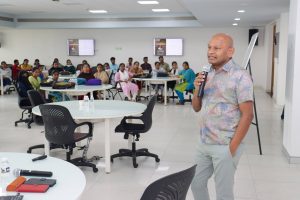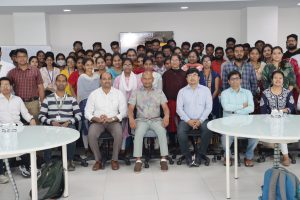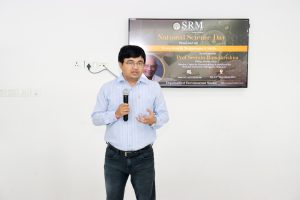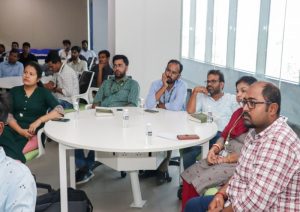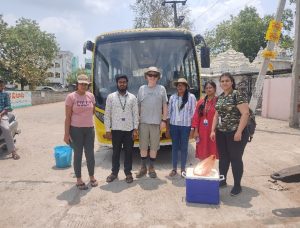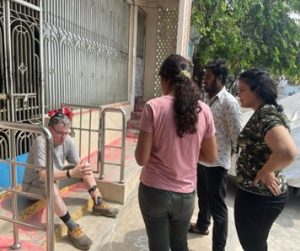A Critical Analysis of Solid Waste Microplastics
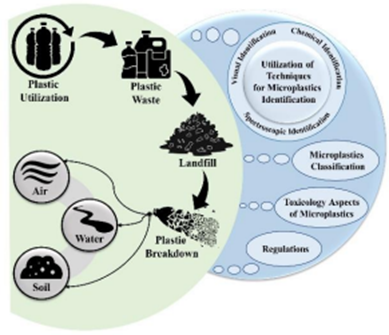
Solid waste is primarily an overlook source of Microplastics that contribute to a delirious amount of pollution to the environment. Thus, a clear understanding of the occurrence and degradation pathways of solid waste microplastics is critical to develop exhaustive control strategies. Dr Deblina Dutta, Assistant Professor, Department of Environmental Science, has published a paper titled, “An insight on sampling, identification, quantification and characteristics of microplastics in solid wastes” in the Q1 journal Trends in Environmental Analytical Chemistry, having an Impact Factor of 13.62.
Abstract of the Research
Microplastics (MPs) have attracted wide attention worldwide as a remarkable pollutant. While MPs spread throughout several complex environmental matrices, various experiments have been preliminarily concentrated on aquatic ecosystems. Terrestrial sources namely solid waste-origin have remained unexplored, although they contribute largely to the origin of aquatic microplastics. Simultaneously, terrestrial systems under human activity, like healthcare units, are likely to be polluted by various plastic ingredients. Solid waste MPs sources primarily include sanitary landfilling, food waste, wastewater treatment end-product (sludge), tire wear, textile washing and paint failure. These microplastics cause adverse impacts on the ecosystem, environment, and health. Accordingly, the present study addressed solid waste MPs’ occurrence and sources, identification, quantification, characterisation, fate, and degradation pathways for developing comprehensive management strategies following the principles of a circular economy.
In particular, this paper critically demonstrated solid waste MPs sources, solid waste MPs sampling followed by identification and quantification by adopting combined chemical (e.g., spectroscopy viz., Fourier transform infrared (FTIR) spectroscopy, and Raman spectroscopy), physical (e.g., microscopies such as transmission or scanning electronic microscopy, TEM or SEM) and thermal analyses. Additionally, the strengths and limitations of each analytical technique are discussed critically with practical aspects. Further, national and international regulations or laws and their subsequent relevance to solid waste MPs management with future challenges are critically discussed. Finally, the outcomes of the review paper will be valuable to different stakeholders for effective policy implementation.
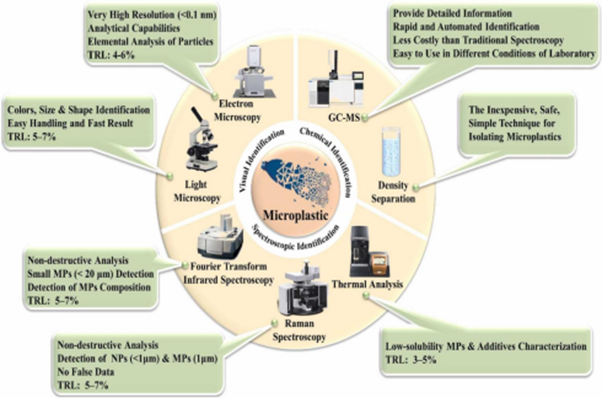
Explanation of the Research in Layperson’s Terms
The published paper deals with microplastics (5 mm to 0.1 μm in size) present ubiquitously in the natural environment including rivers, lakes, estuaries, atmosphere, oceans, soil/sediments, landfilling sites, and wastewater treatment plants. However, microplastics are also present in solid waste and studies related to their identification, characterisation, and quantification are very scarce. Therefore, to know more about microplastics and understand the sources of microplastics in solid waste, the extraction procedures, the identification, characterisation, and quantification techniques, and finally the advantages and disadvantages of each of the processes involved in the identification, characterization, and quantification techniques of microplastics, this study has been carried out.
Practical Implementation/ Social Implications of the Research
Waste-assisted plastic pollution is a major global concern with socio-economic, ecological, and health effects. The present study will make society understand the source of microplastics in solid waste along with its extraction procedures, identification, characterisation, and quantification techniques. If society is aware of the adverse effects of microplastics, then only one can think to protect the environment and human health.
Collaborations
The research has been carried out in collaboration with the University of Burdwan, the University of North Bengal, and CSIR-NEERI, Nagpur.
It is now widely recognised that microplastic pollution poses a serious threat to the environment on a global scale. Having originated from a diverse source, it has persisted in various ecosystems, thereby entering the trophic chain. It has contributed to microplastic pollution in the environment, e-waste being a major source of it. Hence, along with metal recovery from e-waste, regulating microplastic pollution is a growing interest. At this juncture, Dr Dutta’s future research is directed towards resource recovery processes, regulating microplastic pollution, risk assessment, life cycle assessment, and techno-economics analysis.
- Published in Departmental News, ENVS News, News, Research News
Polydisciplinary Approach: Key to Green Economy
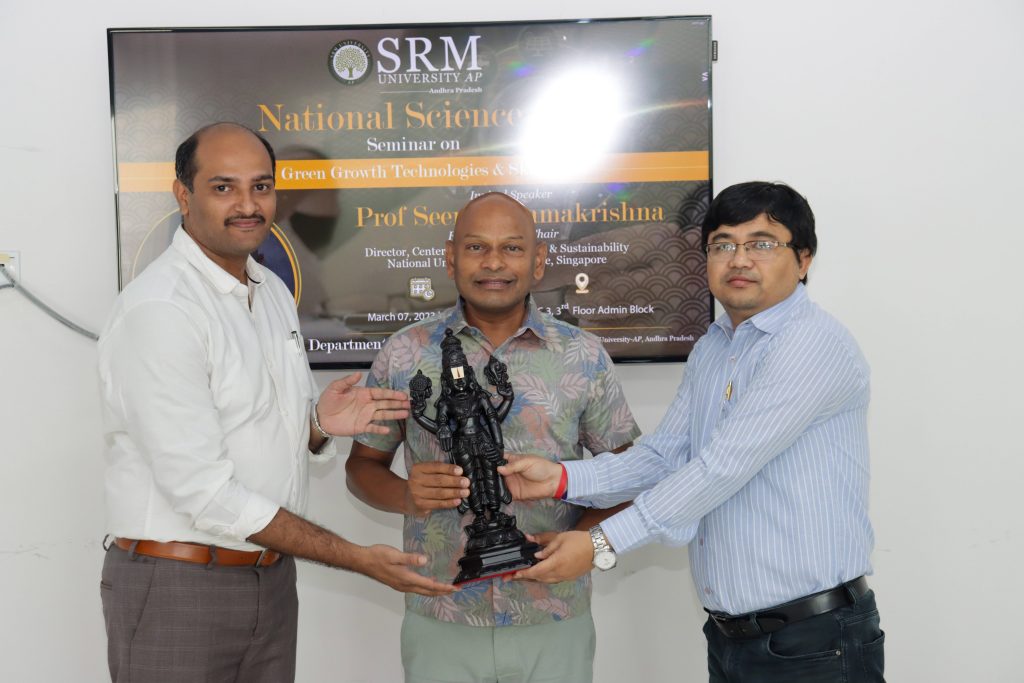
The Department of Environmental Science and Engineering, SRM University-AP organised a National Science Day seminar on “Green Growth Technologies and Skills” on March 07, 2023, to promote awareness on the critical need for sustainable development and a green economy for human sustenance. Prof. Seeram Ramakrishna, FREng, Everest Chair, Director-Center for Nanotechnology & Sustainability, National University of Singapore delivered the session in the presence of Prof. Ranjit Thapa, Dean-School of Engineering and Sciences (SEAS); Dr Karthik Rajendran, Head- Department of Environmental Science and Engineering; Dr Shoji D Thottathil, Assistant Professor, SRM AP and other faculty and students of the university.
“Many challenges and needs of human beings which include climate change, extreme weather, biodiversity loss, food supply, nutrition, healthcare, security, urbanisation, sanitisation, clean water and energy, resources, shelter, transportation and circular economy demand polydisciplinary knowledge and effort,” said Prof. Ramakrishna while addressing the audience. He emphasised that a circular economy or Global commons requires the cooperation and contribution of countries and communities to actualise progress in sustainability. In his talk, Prof. Ramakrishna posited that India had undertaken a progressive stance that will lead to clear advancements in the next 25 years with respect to demographics, economic policies etc.
Prof. Ranjit Thapa, Dean – SEAS remarked that SRM University-AP as a research-intensive institute, with an interdisciplinary academic approach and a culture of research, entrepreneurship and innovation, will promote green growth technology and sustainable development as an integral part of the academia. The seminar was also attended by undergraduate and postgraduate students from neighbouring colleges including Andhra Loyola College, Hindu College, and KBN college. A memento of appreciation was presented to Prof. Ramakrishna by Prof. Ranjit Thapa and Dr Karthik Rajendran. Dr Pankaj Pathak, Assistant Professor, Department of Environmental Science and Engineering delivered the vote of thanks.
- Published in Departmental News, ENVS News, News
Workshop on Water Resources in India: Challenges and Hazards
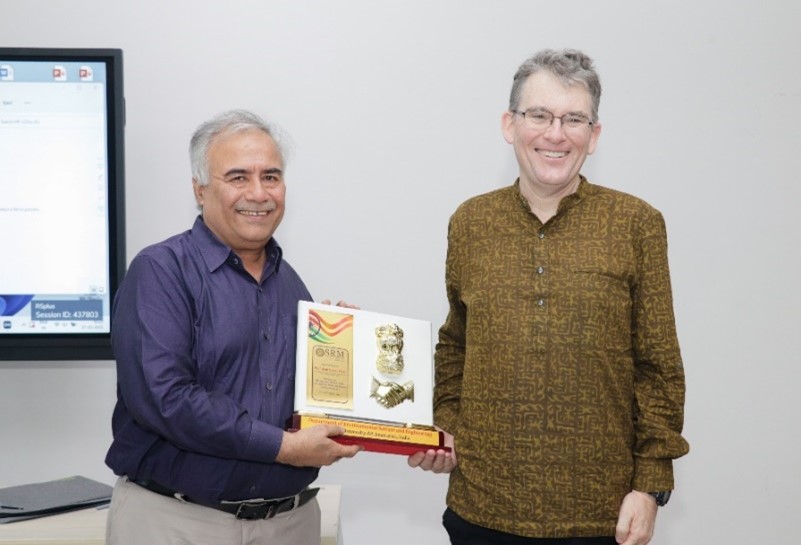
The availability of water as an elixir of life depends on several factors, including land and climate. The Department of Environmental Science and Engineering organised a 2-Day workshop on “How interactions between climate and land use/land cover changes can affect water resources” on March 27 and 28, 2023, in affiliation with the Department of Earth and Environmental Science, University of Kentucky, USA. The workshop was inaugurated by Vice Chancellor Prof. Manoj K Arora. Distinguished academician and researcher, Prof. Alan Ernest Fryar, Department of Earth and Environmental Science, University of Kentucky, was the resource person for the session.
The workshop was conducted with the aim of providing an overview of water resources in India, water resource challenges and hazards, climate change and projected effects, and mitigation and adaptation strategies. Prof. Fryar also explained the groundwater status across India and regional approaches to exploring it as a drinking water resource. He also explained the impact of climate change on groundwater as a fresh drinking water resource and adaptation strategies.
The workshop saw the participation of over 60 faculty, PhD Scholars and UG students from various educational institutions across the district. UG students from the Department of Geology, Hindu College and Chalapathi Institute of Engineering and Technology, Guntur, participated in the session and interacted with Prof. Fryar.
A field visit to the Krishna Riverbank in Amaravati, Guntur, was also conducted as part of the workshop on March 28, where Prof. Fryar interacted with the research scholars and emphasised the importance of field visits and the scientific and systematic way of sample collection from the field. In addition, Prof. Fryar conducted hands-on training on the field instrument (multi-parameter probe, Hanna) for real-time data collection from the river water and groundwater sources in the field.
- Published in Departmental News, ENVS News, News, Workshop
SERB- SURE Grants: 10 projects worth 2.50 crores awarded to SRM AP
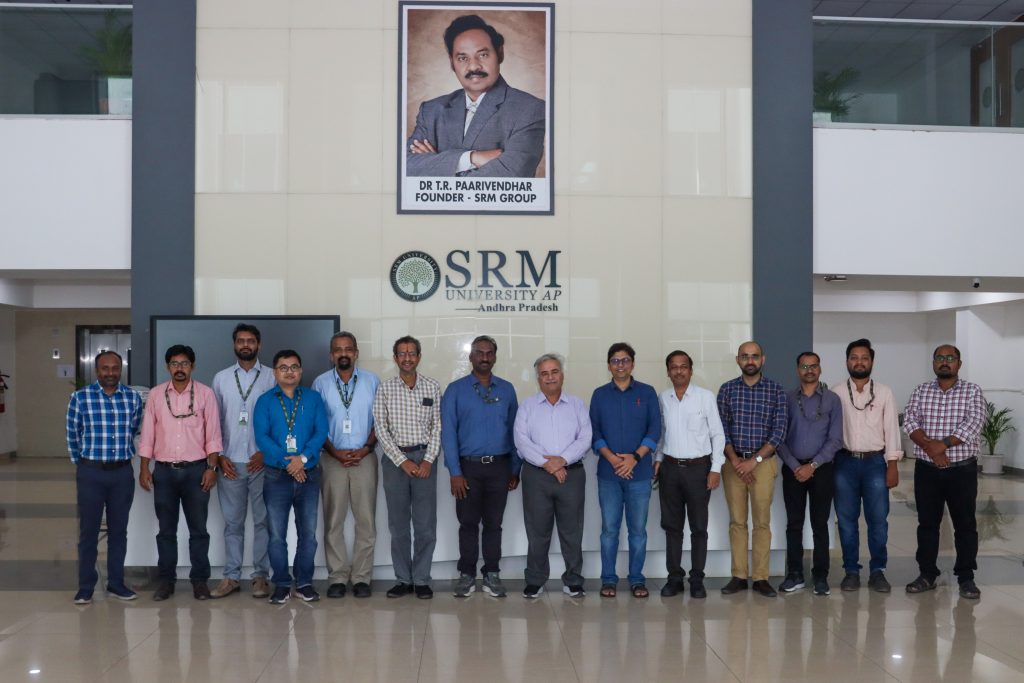
The faculty of SRM University-AP have been awarded 10 projects worth 2.50 crores from the Science and Engineering Research Board (SERB-SURE). Department of Science and Technology (DST) received a total of 2000 proposals, of which 466 were sanctioned. Among the 466 projects, 151 projects were awarded to Private Universities. Of the 151 projects approved to state private universities and colleges throughout India, the five-and-a-half-year young varsity was awarded 10 projects. 10 professors from various Science and Engineering Departments brought this incredible achievement to the university.
SERB-SURE is a research grant scheme initiated by the Science and Engineering Research Board (SERB) in India to provide financial support to young researchers in the early stages of their careers. The grants are intended to support research in basic and applied sciences, engineering, and technology and is typically granted for a period of three years.The SERB-SURE scheme is one of several initiatives by SERB to promote scientific research in India and support the development of a strong research community in the country.
“It is a milestone achievement that resonates with the University’s unparalleled commitment for excellence. We are striving towards research-intensive learning to build cutting-edge innovation for a transformative tomorrow”, commented Vice Chancellor, Prof. Manoj K Arora. The Executive Director-Research of SRM Group, Prof. Narayana Rao said that, “SRM University-AP has travailed hard to achieve the world-class scientific temperament that we now advocate, and this achievement is a testimonial recognition of all our efforts.” The prestigious grants were sanctioned to the faculty in the on-going domains of Quantum Kinetic Approach, Antimicrobial Resistance (AMR) Profiling and Changing of Hydroclimatic conditions in Bay of Bengal among 7 others.
Dean-SEAS, Prof. Ranjith Thapa said, “These research could be path-breaking and could offer a solution to many of the societal difficulties.” Prof. Jayaseelan Murugaiyan, Dr Sandeep Singh and Dr Pitchaiah Cherukuri of the Department of Biological Sciences; Dr Sabyasachi Chakrabortty, Dr V S Baswanth Oruganti of the Department of Chemistry; Dr Debabrata Pramanik, Dr Ravi Kumar and Dr Pankaj Bhalla of the Department of Physics ; Dr Sandeep Kumar Verma of the Department of Mathematics; Dr Uma Maheswar Arepalli of the Department of Civil Engineering; and Dr Kousik Das of the Department of Environmental Science and Engineering were awarded the grants.
- Published in Biology News, Chemistry-news, CIVIL NEWS, Departmental News, ENVS News, Math News, News, Physics News, Research News
World Environment Day Celebrations – An Initiative to Beat Plastic Pollution
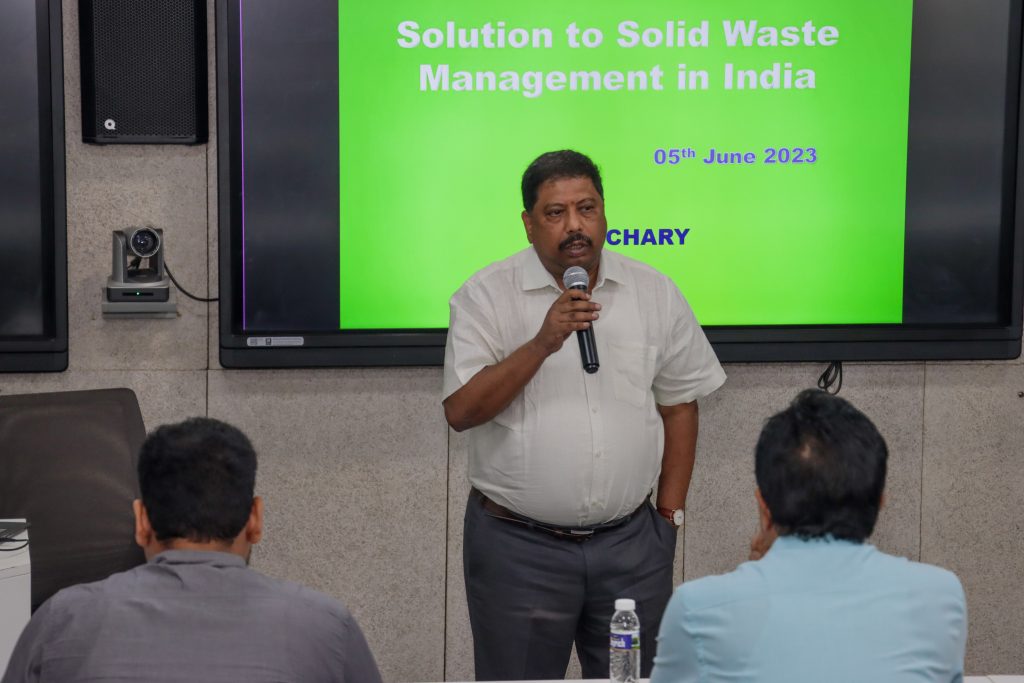
The Department of Environmental Science and Engineering celebrated World Environment Day on June 05, 2023, initiating awareness of the need to combat the climate crisis posed by global plastic pollution. The department organised two invited lectures from industry experts to expound on the theme of World Environment Day 2023, “Solutions to Plastic Pollution”. Efficient ways to tackle plastic pollution in the country and local waste management systems and policies were key points of discussion. Prof. K V Jayakumar, Professor, Department of Civil Engineering, National Institute of Technology, Warangal and Mr M V Chary, President, Jindal Urban Waste Management, Guntur, Andhra Pradesh, were the invited speakers.
Prof. K V Jayakumar lent thought-provoking insights into the types of water and how marketing strategies sell water at high prices to consumers. He also shared his experience of his visits to other countries in Europe and Asia where water is utilised wisely. Apart from water and plastic pollution, he also addressed the pressing issue of climate change happening over the years and the consequent increase in temperature. Prof. Jayakumar also suggested the book “Silent Spring” by Rachel Carson, which is often viewed as a landmark work of environmental writing, focusing on the harmful effects of pesticides on the environment.
Mr M V Chary shared in-depth information about the Jindal Urban Waste Management at Guntur, stating the various source of waste, collection points, transportation to the Jindal Waste – Energy Plant, and how waste is converted to energy (through incineration) at the plant. Unique aspects of the plant were also discussed at length, along with a video presentation demonstrating the complete working of the plant. The interactive session with Mr Chary, wherein he shared his expertise in the industrial sector, was beneficial for the students.
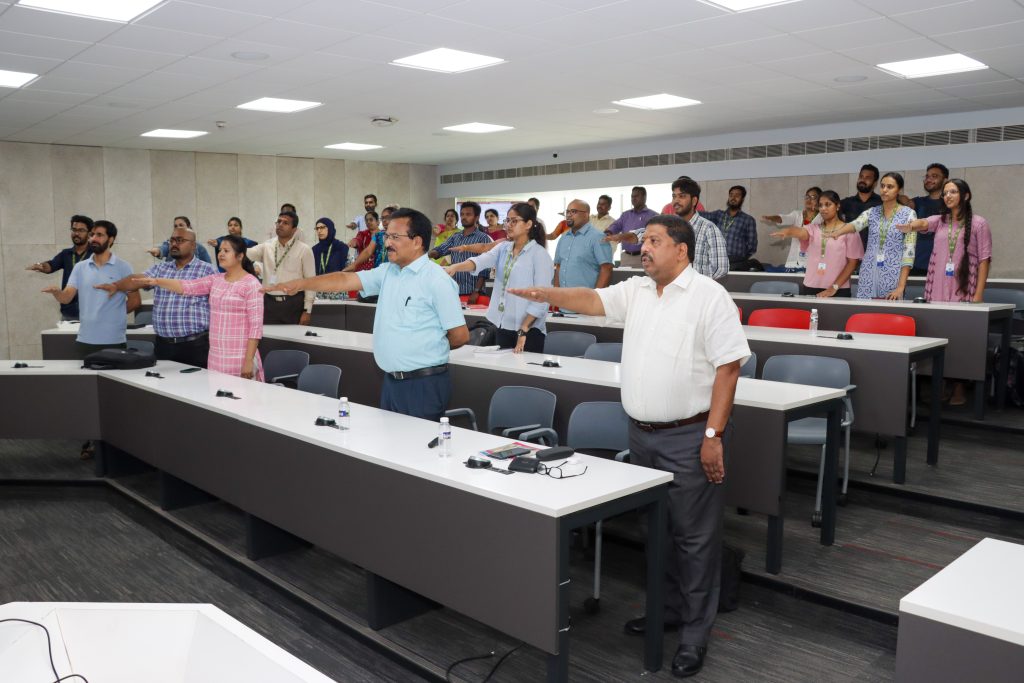
A pledge was taken by all participants at the end of the seminar emphasising the importance of saving the environment, sustainable resource management and the need of awareness among all in reducing the pollution as well as global warming and climate change.
Dr Karthik Rajendran, HOD of the Department, delivered the welcome address and the event witnessed an active participation of 85 participants which constitutes Professors, Faculty, PhD Scholars, Undergraduate students from various departments. There were also faculty and scholars from neighbouring colleges such as Acharya Nagarjuna University, Sidhartha Mahila Kalasala and Ministry of Culture, New Delhi.
- Published in Departmental News, ENVS News, Invited Talks, News


